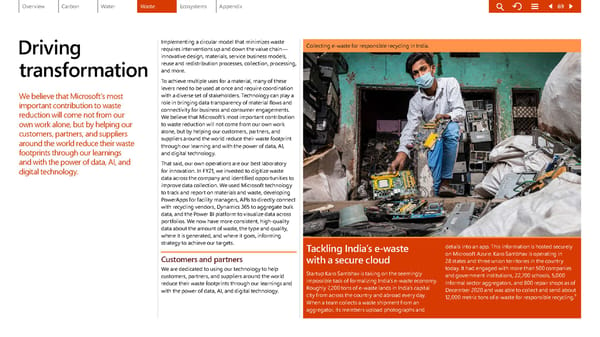Driving transformation We believe that Microsoft’s most important contribution to waste reduction will come not from our own work alone, but by helping our customers, partners, and suppliers around the world reduce their waste footprints through our learnings and with the power of data, AI, and digital technology. Implementing a circular model that minimizes waste requires interventions up and down the value chain— innovative design, materials, service business models, reuse and redistribution processes, collection, processing, and more. To achieve multipl e uses for a material, many of these levers need to be used at once and require coordination with a diverse set of stakeholders. Technology can play a role in bringing dat a transparency of material flows and connectivity for bu siness and consumer engagements. We believe that Microsoft’s most important contribution to waste reduction will not come from our own work alone, but by helping our customers, partners, and suppliers around the world reduce their waste footprint through our learning and with the power of data, AI, and digital technology. That said, our own ope rations are our best laboratory for innovation. In FY21, we invested to digitize waste data across the comp any and identified opportunities to improve data collec tion. We used Microsoft technology to track and report on materials and waste, developing PowerApps for facility managers, APIs to directly connect with recycling vendors, Dynamics 365 to aggregate bulk data, and the Power BI platform to visualize data across portfolios. We now have more consistent, high-quality data about the amount of waste, the type and quality, where it is generated, and where it goes, informing strategy to achieve our targets. Customers and partners We are dedicated to using our technology to help customers, partners, and suppliers around the world reduce their waste footprints through our learnings and with the power of data, AI, and digital technology. Collecting e-waste for responsible recycling in India. Tackling India’s e-waste with a secure cloud Startup Karo Sambhav is taking on the seemingly impossible task of formalizing India’s e - waste economy. Roughly 7,200 tons of e - waste lands in India’s capital city from across the country and abroad every day. When a team collects a waste shipment from an aggregator, its members upload photographs and details into an app. This information is hosted securely on Microsoft Azure. Karo Sambhav is operating in 28 states and three union territories in the country today. It had engaged with more than 500 companies and government institutions, 22,700 schools, 5,000 informal sector aggregators, and 800 repair shops as of December 2020 and was able to collect and send about 12,000 metric tons of e - waste for responsible recycling. 8 - - - 69
 Environmental Sustainability Report | Microsoft Page 68 Page 70
Environmental Sustainability Report | Microsoft Page 68 Page 70